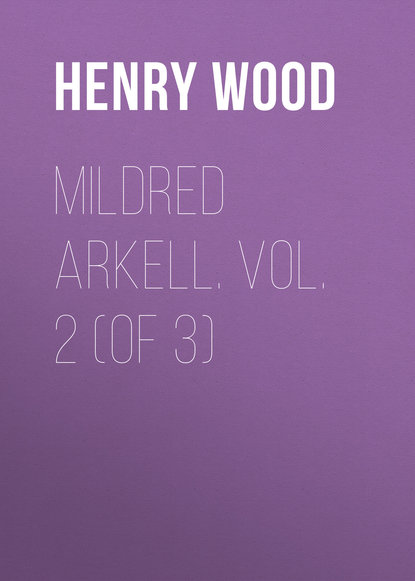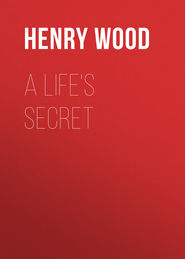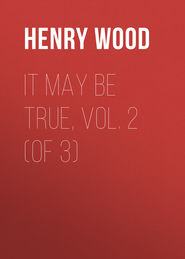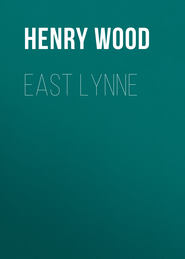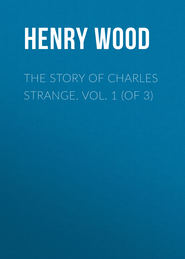По всем вопросам обращайтесь на: info@litportal.ru
(©) 2003-2024.
✖
Mildred Arkell. Vol. 2 (of 3)
Настройки чтения
Размер шрифта
Высота строк
Поля
"Can I do anything for you?" asked the stranger, stepping forward. "I perceive we are countrymen."
Overjoyed at hearing once more his own language, the unhappy traveller seized the Englishman's hand with a rush of delight, and explained the prolonged torture he had gone through, and the doubt and dilemma he was still in—at least as well as he could explain what was to him still a mystery. "The savages cannot understand me," he concluded politely, "and of course I cannot be expected to understand them."
Neither could the stranger understand just at first; but with the conductor's tale on one side and Mr. Dundyke's on the other, he made out the difficulty, and set things straight for him, and went with him to the diligence office. No coach started for Chambéry, by which route they must now proceed, till the next morning at nine, so the stranger took two places for them in that.
"I'm under eternal obligations to you, sir," exclaimed the relieved traveller, "and if ever I should have it in my power to repay you, be sure you count on me. It's a common-councilman, sir, that you have assisted; that's what I am at home, and I'm going on to be Lord Mayor. You shall have a card for my inauguration dinner, sir, if you are within fifty miles of me. You will tell me your name, and where you live?"
"My name is Robert Carr," said the stranger. "I am a clergyman. I am from Holland."
The name struck on a chord of Mrs. Dundyke's memory. It took her back to the time when she was Betsey Travice, and on a certain visit at Westerbury. Though not in the habit of putting herself forward when in her husband's company, she turned impulsively to the stranger now.
"Have you relations at Westerbury, sir? Was your mother's name Hughes?"
"Yes," he said, looking very much surprised. "Both my father and mother were from Westerbury. I have a grandfather, I believe, living there still. My mother is dead."
"How very strange!" she exclaimed. "Can you come in this evening to us at the hotel for half-an-hour?"
"I would, with pleasure, but I leave Grenoble this afternoon," was the young clergyman's answer. "Can I do anything for you in London?"
"Nothing," said Mrs. Dundyke. "But my husband has given you our address; and if you will call and see us when we get home–"
"And you'll meet with a hearty welcome, sir," interrupted the common-councilman, shaking his hand heartily. "I'm more indebted to you this day than I care to speak."
Mrs. Dundyke watched him out of the yard. He might be about four-and-twenty; and was of middle height and slightly made, and he walked away coughing, with his hand upon his chest.
"David," she said to her husband, "I do think he must be a relative of yours! The Hughes's of Westerbury were related in some way to your mother."
"I'm sure I don't know," said David Dundyke. "I think I have heard her talk about them, but I am not sure. Any way I'm obliged to him; and mind, Betsey, if he does come to see us in London, I'll give him a right good dinner."
Ah, how little! how little do we foresee even a week or two before us! Never in this world would those two meet again.
And Mr. and Mrs. Dundyke proceeded under convoy to the Hôtel des Trois Dauphins, and made themselves as comfortable for the night as circumstances and the stinging gnats permitted.
Arriving at Geneva without further let or hindrance, David Dundyke, Esquire, and his wife, put up at the Hôtel des Bergues. And on the morning afterwards, when Mrs. Dundyke had dressed herself and looked about her, she felt like a fish out of water. The size of the hotel, the style pervading it, the inmates she caught chance glimpses of in the corridors, were all so different from anything poor humble Betsey Dundyke had been brought into contact with, that she began to feel her inferiority. And yet she looked like a lady, in her good and neat dress, and her simple cap half covering her fair and still luxuriant hair. Her face was red, tanned with the journey; but it was a pleasing and a nice face yet to look upon.
They descended to the great salle a little before ten. Many groups were breakfasting there at the long tables; most of them English, as might be heard by their snatches of quiet conversation. Some of them possessed an air of distinction and refinement that bespoke their standing in society. An English servant came in once and accosted his master as "my lord;" and a plain little body in a black silk gown and white net cap, was once spoken to as "Lady Jane." Mr. Dundyke had never, to the best of his knowledge, been in a room with a lord before; had never but once set eyes on a Lady Jane; and that was King Henry the Eighth's wife in waxwork; and, alive to his own importance though the common-councilman was, he felt unpleasantly out of place amidst them. In spite of his ambition his nature was a modest one.
Scarcely had he and his wife begun breakfast, when a lady and gentleman came in and took the seats next to him. The stranger was a tall, dark, rather handsome man; taller than Mr. Dundyke, who was by no means undersized, and approaching within three or four years to the same age. But while the common councilman was beginning to get rather round and puffy, just as an embryo alderman is expected to be, the stranger's form was remarkable for wiry strength and muscle: in a tussle for life or death, mark you, reader, the one would be a very child in the handling of the other.
Mr. Dundyke moved his chair a little to give more room, as they sat down, and the gentleman acknowledged it with a slight bow of courtesy. He spoke soon after.
"If you are not using that newspaper, sir," pointing to one that lay near Mr. Dundyke, "may I trouble you for it?"
"No use to me, sir," said the common-councilman, passing the journal. "I understand French pretty well when it's spoke, but am scarcely scholar enough in the language to read it."
"Ah, indeed," replied the stranger. "This, however, is German," he continued, as he opened the paper.
"Oh—well—they look sufficiently alike in print," observed the common-councilman. "Slap-up hotel, this seems, sir."
"Comfortable," returned the stranger, carelessly. "You are a recent arrival, I think."
"Got here last night, sir, by the diligence. We are travelling on pleasure; taking a holiday."
"There's nothing like an occasional holiday, a temporary relaxation from the cares of business," remarked the stranger, scanning covertly Mr. Dundyke. "As I often say."
"I am delighted to hear you say it, sir," exclaimed the common-councilman, hastily assuming a fact, from the words, which probably the speaker never thought to convey. "I am in business myself, sir, and this is the first holiday from it I have ever took: I gather that you are the same. Nothing so respectable as commercial pursuits: a London merchant, sir, stands as a prince of the world."
"Respectable and satisfactory both," joined in the stranger. "What branch of commerce—if you don't deem me impertinent—may you happen to pursue?"
"I'm a partner in a wholesale tea-house, sir," cried Mr. Dundyke, flourishing his hand and his ring for the stranger's benefit. "Our establishment is one of the oldest and wealthiest in Fenchurch-street; known all over the world, sir, and across the seas from here to Chinar. And as respected as it is known."
"Sir, allow me to shake hands with you," exclaimed the stranger, warmly. "To be a member of such a house does you honour."
"And I am a common-councilman," continued Mr. Dundyke, his revelations increasing with his satisfaction, "rising on fast to be a alderman and Lord Mayor. No paltry dignity that, sir, to be chief magistrate of the city of London, and ride to court in a gold and scarlet dress, and broidered ruffles! I suspect we have got some lords round about us here," dropping his voice to a still lower key, "but I'm blest, sir, if I'd change my prospects with any of them. I'm to be put up for sheriff in October."
"Ah," said the stranger, casting his deep black eyes around, "young scions with more debts than brains, long pedigrees and short purses, dealers in post obits and the like—they can't be put in comparison with a Lord Mayor of London."
"And what line are you in, sir?" resumed the gratified Lord Mayor in prospective. "From our great city, of course?"
The stranger nodded, but, before he answered, he finished his second cotelette, poured out some wine—for his breakfast disdained the more effeminate luxuries of tea and coffee—popped a piece of ice in, and drank it. "Have you heard of the house of Hardcastle and Co.?" he asked, in a tone meant only for Mr. Dundyke's ear.
"The East India merchants?" exclaimed the latter.
The stranger nodded again.
"Of course I have heard of them: who has not? A firm of incalculable influence, sir; could buy up half London. What of them?"
"Do you know the partners personally?"
"Never saw any of them in my life," replied Mr. Dundyke. "They are top-sawyers, they are; a move or two above us city tea-folks. Perhaps you have the honour of being a clerk in the house, sir?"
"I am Mr. Hardcastle," observed the stranger, smiling.
"Bless my soul, sir!" cried the startled Mr. Dundyke. "I'm sure I beg pardon for my familiarity. But stop—eh—I thought–"
"Thought what?" asked the stranger, for Mr. Dundyke came to a pause.
"That Mr. Hardcastle was an old man. In fact, the impression on my mind was, that he was something like seventy."
"Pooh, my dear sir! your thoughts are running on my uncle. He has been virtually out of the firm these ten years, though his name is still retained as its head. He is just seventy. A hale, hearty man he is too, and trots about the grounds of his mansion at Kensington as briskly as one of his own gardeners. But not a word here of who I am," continued the gentleman, pointing slightly round the room: "I am travelling quietly, you understand—incog., if one may say so—travelling without form or expense, in search of a little peace and quietness. I have not a single attendant with me, nor has my wife her maid. Mrs. Hardcastle," he said, leaning back, the better to introduce his wife.
The lady bowed graciously to Mr. and Mrs. Dundyke, and the former, in his flurry to acknowledge the condescension, managed to upset the coffee-pot. Mrs. Dundyke saw a stylish woman of thirty—at least, if a great deal of dress can constitute style. She had a handsome, but deadly pale face, with bold eyes, black as her husband's.
"I feel really glad to make your acquaintance," resumed Mr. Hardcastle. "Standing aloof, as I have purposely done, from the persons of condition staying in the hotel, I had begun to find it slow."
"Sir, I am sure I'm greatly flattered," said Mr. Dundyke. "Have you been long here, sir?"
"About three weeks or a month," replied the gentleman, carelessly. "We shall soon be thinking of going."
Overjoyed at hearing once more his own language, the unhappy traveller seized the Englishman's hand with a rush of delight, and explained the prolonged torture he had gone through, and the doubt and dilemma he was still in—at least as well as he could explain what was to him still a mystery. "The savages cannot understand me," he concluded politely, "and of course I cannot be expected to understand them."
Neither could the stranger understand just at first; but with the conductor's tale on one side and Mr. Dundyke's on the other, he made out the difficulty, and set things straight for him, and went with him to the diligence office. No coach started for Chambéry, by which route they must now proceed, till the next morning at nine, so the stranger took two places for them in that.
"I'm under eternal obligations to you, sir," exclaimed the relieved traveller, "and if ever I should have it in my power to repay you, be sure you count on me. It's a common-councilman, sir, that you have assisted; that's what I am at home, and I'm going on to be Lord Mayor. You shall have a card for my inauguration dinner, sir, if you are within fifty miles of me. You will tell me your name, and where you live?"
"My name is Robert Carr," said the stranger. "I am a clergyman. I am from Holland."
The name struck on a chord of Mrs. Dundyke's memory. It took her back to the time when she was Betsey Travice, and on a certain visit at Westerbury. Though not in the habit of putting herself forward when in her husband's company, she turned impulsively to the stranger now.
"Have you relations at Westerbury, sir? Was your mother's name Hughes?"
"Yes," he said, looking very much surprised. "Both my father and mother were from Westerbury. I have a grandfather, I believe, living there still. My mother is dead."
"How very strange!" she exclaimed. "Can you come in this evening to us at the hotel for half-an-hour?"
"I would, with pleasure, but I leave Grenoble this afternoon," was the young clergyman's answer. "Can I do anything for you in London?"
"Nothing," said Mrs. Dundyke. "But my husband has given you our address; and if you will call and see us when we get home–"
"And you'll meet with a hearty welcome, sir," interrupted the common-councilman, shaking his hand heartily. "I'm more indebted to you this day than I care to speak."
Mrs. Dundyke watched him out of the yard. He might be about four-and-twenty; and was of middle height and slightly made, and he walked away coughing, with his hand upon his chest.
"David," she said to her husband, "I do think he must be a relative of yours! The Hughes's of Westerbury were related in some way to your mother."
"I'm sure I don't know," said David Dundyke. "I think I have heard her talk about them, but I am not sure. Any way I'm obliged to him; and mind, Betsey, if he does come to see us in London, I'll give him a right good dinner."
Ah, how little! how little do we foresee even a week or two before us! Never in this world would those two meet again.
And Mr. and Mrs. Dundyke proceeded under convoy to the Hôtel des Trois Dauphins, and made themselves as comfortable for the night as circumstances and the stinging gnats permitted.
Arriving at Geneva without further let or hindrance, David Dundyke, Esquire, and his wife, put up at the Hôtel des Bergues. And on the morning afterwards, when Mrs. Dundyke had dressed herself and looked about her, she felt like a fish out of water. The size of the hotel, the style pervading it, the inmates she caught chance glimpses of in the corridors, were all so different from anything poor humble Betsey Dundyke had been brought into contact with, that she began to feel her inferiority. And yet she looked like a lady, in her good and neat dress, and her simple cap half covering her fair and still luxuriant hair. Her face was red, tanned with the journey; but it was a pleasing and a nice face yet to look upon.
They descended to the great salle a little before ten. Many groups were breakfasting there at the long tables; most of them English, as might be heard by their snatches of quiet conversation. Some of them possessed an air of distinction and refinement that bespoke their standing in society. An English servant came in once and accosted his master as "my lord;" and a plain little body in a black silk gown and white net cap, was once spoken to as "Lady Jane." Mr. Dundyke had never, to the best of his knowledge, been in a room with a lord before; had never but once set eyes on a Lady Jane; and that was King Henry the Eighth's wife in waxwork; and, alive to his own importance though the common-councilman was, he felt unpleasantly out of place amidst them. In spite of his ambition his nature was a modest one.
Scarcely had he and his wife begun breakfast, when a lady and gentleman came in and took the seats next to him. The stranger was a tall, dark, rather handsome man; taller than Mr. Dundyke, who was by no means undersized, and approaching within three or four years to the same age. But while the common councilman was beginning to get rather round and puffy, just as an embryo alderman is expected to be, the stranger's form was remarkable for wiry strength and muscle: in a tussle for life or death, mark you, reader, the one would be a very child in the handling of the other.
Mr. Dundyke moved his chair a little to give more room, as they sat down, and the gentleman acknowledged it with a slight bow of courtesy. He spoke soon after.
"If you are not using that newspaper, sir," pointing to one that lay near Mr. Dundyke, "may I trouble you for it?"
"No use to me, sir," said the common-councilman, passing the journal. "I understand French pretty well when it's spoke, but am scarcely scholar enough in the language to read it."
"Ah, indeed," replied the stranger. "This, however, is German," he continued, as he opened the paper.
"Oh—well—they look sufficiently alike in print," observed the common-councilman. "Slap-up hotel, this seems, sir."
"Comfortable," returned the stranger, carelessly. "You are a recent arrival, I think."
"Got here last night, sir, by the diligence. We are travelling on pleasure; taking a holiday."
"There's nothing like an occasional holiday, a temporary relaxation from the cares of business," remarked the stranger, scanning covertly Mr. Dundyke. "As I often say."
"I am delighted to hear you say it, sir," exclaimed the common-councilman, hastily assuming a fact, from the words, which probably the speaker never thought to convey. "I am in business myself, sir, and this is the first holiday from it I have ever took: I gather that you are the same. Nothing so respectable as commercial pursuits: a London merchant, sir, stands as a prince of the world."
"Respectable and satisfactory both," joined in the stranger. "What branch of commerce—if you don't deem me impertinent—may you happen to pursue?"
"I'm a partner in a wholesale tea-house, sir," cried Mr. Dundyke, flourishing his hand and his ring for the stranger's benefit. "Our establishment is one of the oldest and wealthiest in Fenchurch-street; known all over the world, sir, and across the seas from here to Chinar. And as respected as it is known."
"Sir, allow me to shake hands with you," exclaimed the stranger, warmly. "To be a member of such a house does you honour."
"And I am a common-councilman," continued Mr. Dundyke, his revelations increasing with his satisfaction, "rising on fast to be a alderman and Lord Mayor. No paltry dignity that, sir, to be chief magistrate of the city of London, and ride to court in a gold and scarlet dress, and broidered ruffles! I suspect we have got some lords round about us here," dropping his voice to a still lower key, "but I'm blest, sir, if I'd change my prospects with any of them. I'm to be put up for sheriff in October."
"Ah," said the stranger, casting his deep black eyes around, "young scions with more debts than brains, long pedigrees and short purses, dealers in post obits and the like—they can't be put in comparison with a Lord Mayor of London."
"And what line are you in, sir?" resumed the gratified Lord Mayor in prospective. "From our great city, of course?"
The stranger nodded, but, before he answered, he finished his second cotelette, poured out some wine—for his breakfast disdained the more effeminate luxuries of tea and coffee—popped a piece of ice in, and drank it. "Have you heard of the house of Hardcastle and Co.?" he asked, in a tone meant only for Mr. Dundyke's ear.
"The East India merchants?" exclaimed the latter.
The stranger nodded again.
"Of course I have heard of them: who has not? A firm of incalculable influence, sir; could buy up half London. What of them?"
"Do you know the partners personally?"
"Never saw any of them in my life," replied Mr. Dundyke. "They are top-sawyers, they are; a move or two above us city tea-folks. Perhaps you have the honour of being a clerk in the house, sir?"
"I am Mr. Hardcastle," observed the stranger, smiling.
"Bless my soul, sir!" cried the startled Mr. Dundyke. "I'm sure I beg pardon for my familiarity. But stop—eh—I thought–"
"Thought what?" asked the stranger, for Mr. Dundyke came to a pause.
"That Mr. Hardcastle was an old man. In fact, the impression on my mind was, that he was something like seventy."
"Pooh, my dear sir! your thoughts are running on my uncle. He has been virtually out of the firm these ten years, though his name is still retained as its head. He is just seventy. A hale, hearty man he is too, and trots about the grounds of his mansion at Kensington as briskly as one of his own gardeners. But not a word here of who I am," continued the gentleman, pointing slightly round the room: "I am travelling quietly, you understand—incog., if one may say so—travelling without form or expense, in search of a little peace and quietness. I have not a single attendant with me, nor has my wife her maid. Mrs. Hardcastle," he said, leaning back, the better to introduce his wife.
The lady bowed graciously to Mr. and Mrs. Dundyke, and the former, in his flurry to acknowledge the condescension, managed to upset the coffee-pot. Mrs. Dundyke saw a stylish woman of thirty—at least, if a great deal of dress can constitute style. She had a handsome, but deadly pale face, with bold eyes, black as her husband's.
"I feel really glad to make your acquaintance," resumed Mr. Hardcastle. "Standing aloof, as I have purposely done, from the persons of condition staying in the hotel, I had begun to find it slow."
"Sir, I am sure I'm greatly flattered," said Mr. Dundyke. "Have you been long here, sir?"
"About three weeks or a month," replied the gentleman, carelessly. "We shall soon be thinking of going."





